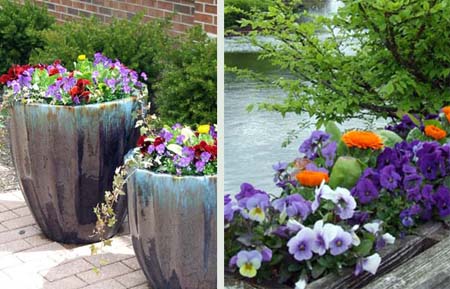When can I plant? Check your area’s frost free date
Don't let spring planting fever catch your tender annuals with a reminder from ol' man winter. Plant cold-tolerant pansies for early spring color.
View statewide table for frost free dates.
As the weather warms, gardeners work like beavers to get their beds and containers planted. Weddings, graduation parties and Memorial Day weekend festivities intensify our desire to have gardens “picture perfect” for those special events, but sometimes Mother Nature doesn't cooperate. I remember in the not-too-distant past having a hard freeze on Memorial Day weekend that knocked out much of our state’s fruit crop and everybody's favorite Hosta, too.
If you want to get a jump on spring planting, you may want to invest in the humble, albeit adorable, pansy. Pansy breeding has come a long way since you may have planted them as a child. Brilliant colors, interesting “faces” and different sizes compliment their naturally cold-hardy personality. The great new feature of pansy is their increased ability to withstand summer heat. My pansy bed from last year thrived right into July, when I finally got around to planting those heat-loving ornamental peppers and leafy tropicals.

Photos 1 and 2. Left, pansies make the perfect complement to spring containers and early summer bulbs. Right, colorful, cold tolerant pansies add a splash of personality to the early spring garden.
With a cooler than average spring predicted, it is always wise to be thinking about cold tolerance as you prepare to plant your garden beds. Annuals such as petunia, snap dragon, stock, Dianthus, Verbena, Geranium and Alyssum are pretty forgiving when it comes to cold day or night temperatures, but there are a few "cantankerous characters" in your play that you should be cautious putting on stage.
Impatiens, Dahlia and Coleus are a few that don't even like 40 degree nights. One year, in an overzealous moment, I planted all my impatiens – six flats – right before a week of cold nights and the plants did not die, but just sat there until July when warm nights pushed them out of shock. Be wary about soft-tissue tropicals like Elephant Ear as well. Just remember, the zone where these plants grow natively has evenly warm temperatures without huge day or night swings. No amount of fertilizer will get them to move once they have their feelings hurt!
Generally speaking, Grand Rapids' average last frost date is listed at May 27 while just a few miles away, Greenville is listed at June 27! This big swing can also be seen from East to West as Detroit is listed as April 30 for average last frost. Please note the word AVERAGE here (view statewide table of frost free dates). With the beautiful weather coming up, it will be greatly tempting to set out all your plants but be cautioned, if the weather cools off significantly you may want to cover even if there is no hard freeze in the forecast!
Find out about other educational resources and classes at www.migarden.msu.edu and at Finneran’s blog.



 Print
Print Email
Email




